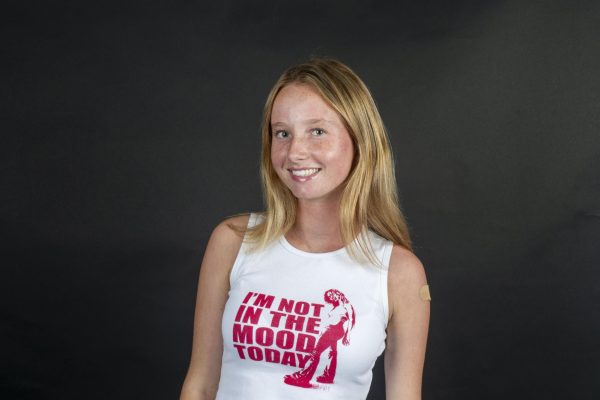Standing on a stage instead of seated around the Thanksgiving table, junior twin sisters Jola and Reeve Phelan competed in one of the most important Irish dance competitions of the year over break. Accomplishing an achievement that only 10 other 16-year-old girls in the Western US region can relate to, they qualified for the World Irish Dance Championships coming up in April 2025. After months of tirelessly practicing and polishing up routines, Jola and Reeve placed ninth and 10th, respectively, at Western US Region Oireachtas results, clinching their spots.
“When I was called [for ninth place], I was just waiting and waiting [on the stage] for Reeve to get her number called. I kept looking back for her, and then they called her number and I jumped up and gave her a huge hug,” Jola said. “It was a crazy moment. There were kids from the dance studio crying, parents crying. It was very emotional because we’ve been working so hard for those spots.” 
At the Oireachtas, each competition starts with about 80 girls in each age division, and the dancers have to make it through two rounds of solo dances. About 30-40 girls are then called back to do their solo piece individually, and at awards, the top dancers—usually around 12—qualify for the World Championships.
“You’re trying to not bump into the other girl, [but] you need to get out in front of her, and it’s very intense,” Reeve said. “The judges see who’s hitting what marks, and the objective is to beat the girl next to you.”
Jola and Reeve’s training leading up to Oireachtas was intense, with two to three hour practices three times a week and six-hour training sessions on Sundays.
“We’d get there at 11 a.m. and be done at 4 or 5 p.m. We’d do stamina work, ab workouts, box jumps, all sorts of cardio. We would do full-outs, which is performing all of the routine giving 100 percent energy,” Reeve said.
The twins have been Irish dancing for nine years, starting when they were 7-years-old under the coaching of their mother, who owns the De Barra Academy of Irish Dance in Manhattan Beach. Before beginning Irish dance, they tried other dance styles including ballet, contemporary, hip hop and jazz.
“Our mom decided she wouldn’t push us either way. I’m happy that we got to explore other styles, because it made our path to Irish dance feel much more clear,” Reeve said. “When we finally tried an Irish dance class, we liked it so much more, so we quit everything else.”
Along with the demanding schedule of Irish dance, both girls participate in other time-consuming sports, playing for three of the school’s teams combined. Reeve plays lacrosse, and Jola plays flag football and runs short-distance track.
“[Balancing everything] is definitely difficult, you have to take it step-by-step. Things are going to get really intense towards the springtime, when we’re training for Worlds and [lacrosse and track] are in-season,” Jola said.
Multiple sports each are only one factor. The twins also have to budget their time to fit in schoolwork and studying in between practices and workouts.
“Whenever I get a day off, that’s when I’m doing my homework. I try to not miss any dance classes or training,” Reeve said. “Since freshman year, I’ve learned to be good at time management, [because] so many things are always overlapping.”
The work to be done to prepare for the World Championships isn’t limited to intensive physical training. The girls have goals that take mental toughness and combine what they’ve learned from other sports to achieve them.
“Dancing, you have to remember every single step of choreography you’ve learned over the course of six months, and it can be so defeating to get it wrong,” Jola said. “It takes training and training and training to make it come natural. That’s the point I’m trying to get to so during my routine I can focus on other things like making sure I’m smiling, bringing enough energy, things like that.”
Reeve and Jola have learned to deal with one struggle that comes with the territory of being a twin: being pitted against each other.
“There’s a bunch of comparing that we have to deal with, but we’ve learned to handle it really well because our mindset is that it’s a win for both of us,” Jola said. “The placements don’t really matter because it fluctuates. Sometimes I’ll do better, and then the next time Reeve will do better. No matter what, we’re happy for each other.”
The twins push each other and rely on each other in dance to succeed together, according to Reeve. Their shared dedication and love for Irish dance allows them both to thrive.
“My strengths are her weaknesses, and her weaknesses are my strengths. We help each other learn new things in the studio if one picks it up before the other,” Reeve said. “It’s nice to have someone who’s always rooting for you. No matter if we’re in the same competitions, we always have each other’s backs and it’s a great feeling.”



